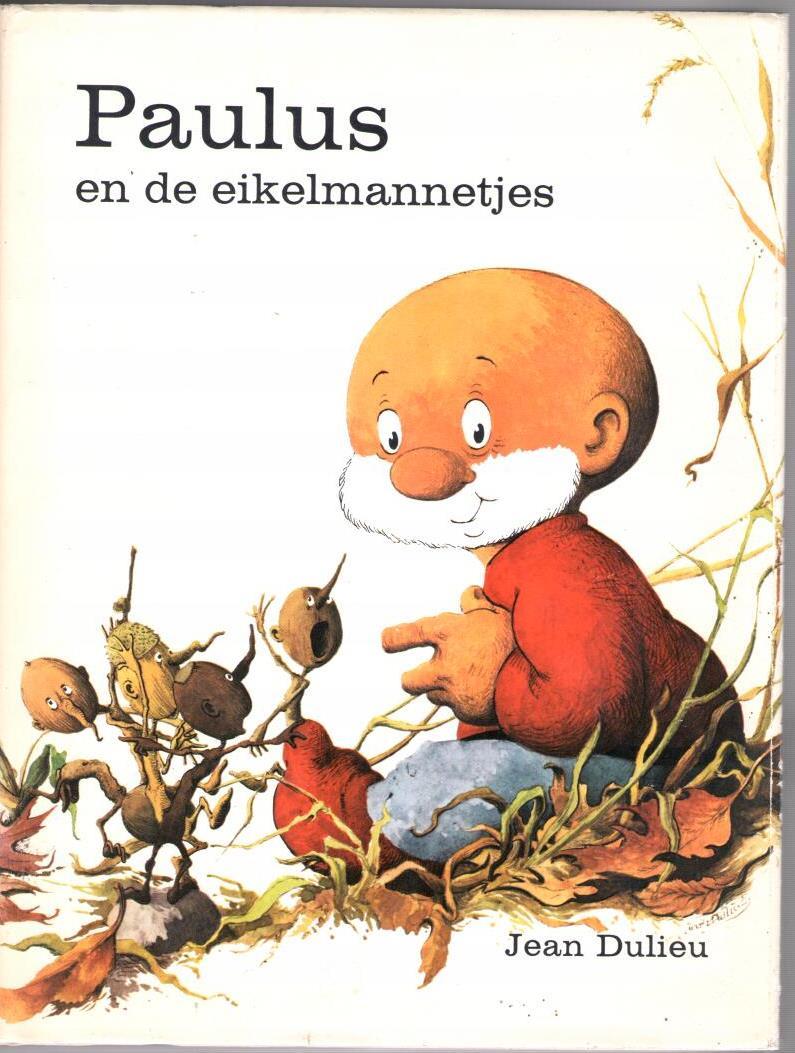Paulus and the Acorn Men
For almost forty years, Jean Dulieu produced the humorous adventures of his creation Paulus the Wood Gnome, without help from anyone else: they were initially published as a beautifully drawn newspaper strip (1946). Then came the puppet show, the radio play, the record, the serial story in magazines, the puppet TV series, the animated cartoon and the illustrated children’s book.

The thirty-three Paulus books are characterised by the ingenious resonance and creativity of the language, by the sophisticated pen drawings and the bright watercolours.
Every book about this slightly naive, very human wood gnome and his comical fellow woodland dwellers, Salomo the raven, the pompous owl Oehoeboeroe and the whining, pestering witch Eucalypta, is unforgettable. But Paulus en de eikelmannetjes (Paulus and the Acorn Men, 1965) is unsurpassed.
In this humorous, philosophical adventure story about biological decay and the inescapable cycle of nature, you experience both the emptiness and the abundance of the autumn in full. Dulieu applied watercolours to an oil-paint base, creating ingenious, colourful pictures that form a mysterious, mycelium-like whole. The shrieking wind blows throughout the book. The ‘rustling and stirring and shuffling’ of whirling leaves can be heard on every page. As the gusts of wind rise, the ‘crackles and cracks and snaps’ blow in from all directions. And throughout these sentences, so resonant with autumnal sounds, the acorns constantly drop down: ‘smack, bang’.
They turn out to be the empty-headed acorn men: large in number, small of wit.
A magic prank by Eucalypta makes Paulus their reluctant king, and he has to bring order to their kingdom. However, this turns out to be a hopeless task. Paulus’ windblown subjects whirl around like enthusiastic ne’er-do-wells, dragging him against his will into lots of woodland adventures.
After a visit to the Old Oak, the omniscient Great Father of the acorn men, ‘or Family Tree, call him what you want’, Paulus realises that ‘the acorn men’s sense of direction forces them into a fatal cycle’ that controls their entire life. Following the death of one of the acorn men, he understands that they only gain any purpose when they’re buried and rise again from the ground.
Paulus, suffering from homesickness, realises that being king is pointless and, in spite of certain pangs of regret, this changed wood gnome leaves the ‘world of the acorn men’: an enchanting world to be revisited every autumn.
Publishing details
Paulus en de eikelmannetjes (19
239 pages
5+
Publisher
Leopold
Paulus the wood gnome, the magnum opus of Jean Dulieu, also remains invincible. Dulieu is a great narrator, filling his stories with fairytale mysteries and intrigues that continue to thrill young readers.
de Volkskrant
His rich imagination and gentle humour express a great sense of love for humankind and a positive attitude to life. Dangers and wickedness will always remain, but there’s always a solution to be found.
Het ABC van de Jeugdliteratuur